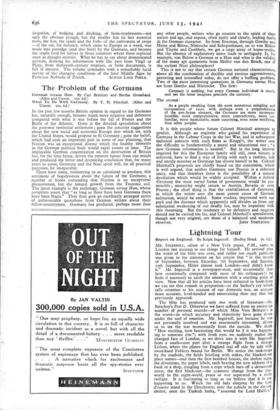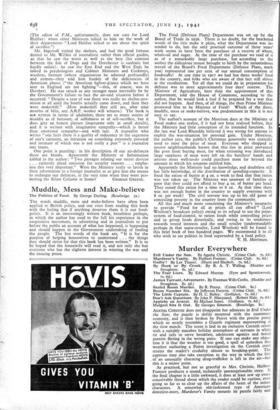Lightning Tour
Report on England. By Ralph Ingersoll. (Bodley Head. 7s. 6d.)
MR. INGERSOLL, editor of a New York paper, P.M., came to London last autumn to see things for himself. He arrived after the worst of the blitz was over, and rather too much publicity was given to the statement on his return that " in the month of September, between Saturday, 7th September, and Sunday, 15th September, Hitler almost took London—and didn't know it." Mr. Ingersoll is a newspaper-man, and occasionally (but how occasionally compared with most of his colleagues!) he finds it necessary to catch the attention with a startling point of view. Now that all his articles have been collected in book-form we can see that remark in proportion—as the barker's cry which calls attention to his account of our domestic war, an account more accurate, level-headed and entertaining than any that has previously appeared.
The blitz has produced only one work of literature—Mr. Strachey's Post D. Otherwise we have suffered from an enormous number of personal records—of which Miss Vera Brittain's is the worst—in which accuracy and objectivity have gone down under the surf of emotion. Mr. Ingersoll, just because he was not personally involved and was enormously interested, allows us to see the war momentarily from the outside. We think " How exciting, how fascinating this would be if it was happen- ing to someone else "; with fresh eyes we suddenly realise the changed face of London, as we drive into it with Mr. Ingersoll from a south.-coast port after a strange flight from a strange Lisbon, where the planes for England taxi off side by side with swastikaed Fokkers bound for Berlin. We notice the tank-traps by the roadside, the fields bristling with stakes, the blacked-out place names—and then the first bombed houses, the shelter signs, the diversions, the paper labels, each bearing the new address of a bank or a shop, dangling from a rope which bars off a devastated street, the first black-out—the dramatic change from the day- world to the night-world, peace or war separated by a short twilight. It is fascinating so long as we believe that it is not happening to us. Watch the old lady sleeping by the hors d'oeuvre stand in the Dorchester; note the cubicle in the ele!Tant, shelter, once the Turkish baths, " reserved for Lord Halifax.' (The editor of P.M., unfortunately, does not care for Lord Halifax: when other Ministers talked to him on the work of their departments " Lord Halifax talked to me about the spirit of sacrifice.") Mr. Ingersoll visited the shelters, and had the good fortune denied to Mr. Willkie of journalistic rather than official guides, so that he saw the worst as well as the best (his contrast between the Isle of Dogs and the Dorchester is sardonic but hardly unfair): he saw the East End and the West End; he talked to psychologists and Cabinet Ministers and Cockneys, wardens, firemen (whose organisation he admired profoundly) and airmen—they told him frankly of the deficiencies of American planes (" the American fighter-planes which we have sent to England are not fighting "—this, of course, was in October). He was struck as any stranger must inevitably be by the Government's failure to face the air-raid situation before it occurred. " Despite a year-of war there was really no shelter-pro- vision at all until the bombs actually came down, and then they were makeshift." (How makeshift they still are, after nine months of blitz, any A.R.P. worker will witness.) The book is not written in terms of adulation. there are as many stories of muddle as of heroism; of selfishness as of self-sacrifice, but it does give an honest picture (inaccurate only in small details), and it is written with imaginative sympathy—which is better than emotional sympathy—and with tact. A journalist who writes " one feels there is a quality of indecency in the eagerness of one's curiosity, an intrusion on something extremely personal and intimate of which one is not really a part " is a journalist one trusts. One point is puzzling: in his description Of our air-defences there are blanks. Apparently the Ministry of Information cabled to the author : " Two passages relating our secret devices . . earnestly plead omission for security reasons . . . empha- sise this very important." Were the Ministry really so lavish in their information to a foreign journalist as to give him the means to endanger our defences, at the-very time when they- were pro- moting the Silent Column at home? GRAHAM GREENE.



























 Previous page
Previous page